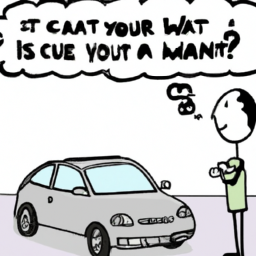
Hey there, friend! Have you ever been in a car accident and realized that your insurance policy doesn’t cover all the damages? It’s a frustrating and stressful situation to be in, and unfortunately, it’s more common than you might think. In this article, we’ll discuss what to do if your car insurance doesn’t pay enough and explore some practical solutions to help you get back on track. So, grab a cup of coffee, sit back, and let’s dive in!
What To Do When Your Car Insurance Doesn’t Pay Enough
Car insurance is an essential requirement for any car owner. It protects you against financial loss in case of accidents or damages. However, what happens when your car insurance company doesn’t pay enough to cover the losses?
It’s no secret that insurance companies have their ways to reduce payouts to policyholders. They may undervalue your car, dispute the extent of the damage, or simply offer a low settlement. To ensure you receive the adequate payout you deserve, there are a few steps you can take.
In this article, we will cover what you should do when your car insurance doesn’t pay enough. From filing a dispute to hiring a lawyer, we’ll explore all the options available.
1. Understand Your Policy
Before you file a dispute, it’s essential to understand the intricacies of your policy. Review your policy documents carefully and familiarize yourself with the coverage limits, deductibles, and limitations. Knowing what your policy covers and how much you’re entitled to receive can help you negotiate with your insurance company more effectively.
2. Gather Evidence
Gathering evidence is crucial to building a strong case for why you deserve more than the insurer’s initial offer. Take the time to record as much information as possible, including pictures of the damage, police reports, and witness statements. All of these can help demonstrate the extent of the loss and the amount of compensation you’re entitled to.
3. Contact Your Insurer
The first step to take when you believe you’re not getting an adequate payout is to contact your insurance provider. Explain the situation and present your evidence. Your insurer may be willing to review your claim and offer a settlement that better reflects the extent of your losses.
4. File a Dispute
If your insurer refuses to offer a reasonable settlement, it’s time to file a dispute. Many insurance companies have a dispute resolution process that you can follow. This typically involves filling out a dispute form, submitting evidence, and waiting for an arbitrator to review your case.
4. Hire a Public Adjuster
A public adjuster is a licensed professional who can assist you in settling a claim with an insurance company. These professionals are independent and work on behalf of the policyholder, not the insurance company. They have the expertise to negotiate with insurers, prepare detailed damage assessments, and advocate on your behalf to ensure you receive the maximum payout possible.
5. Hire a Lawyer
If you’ve exhausted all other options and still feel you’re not getting the compensation you deserve, it may be time to hire a lawyer. An attorney with experience in car insurance claims can help you navigate the legal system, understand your rights, and pursue legal options to get the payout you’re entitled to.
Conclusion
When your car insurance doesn’t pay enough, it can feel frustrating and overwhelming. But there are steps you can take to ensure you receive the payout you’re entitled to. By understanding your policy, gathering evidence, contacting your insurer, filing a dispute, and potentially hiring a public adjuster or attorney, you can fight back against insurance companies who try to reduce their payouts to policyholders.
Remember that the key is to be persistent, patient, and prepared with evidence to back up your claim. With the right approach, you can ensure that you receive a fair settlement for your car’s damages.
